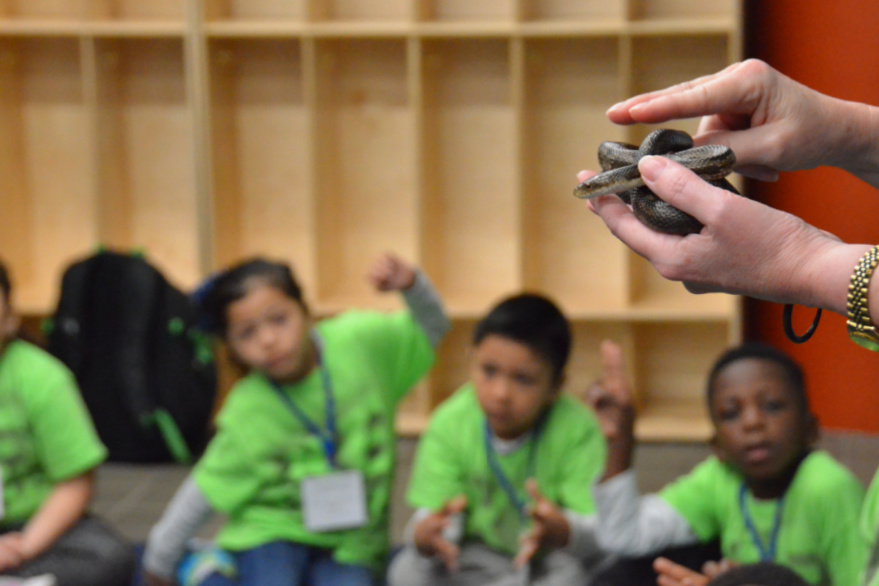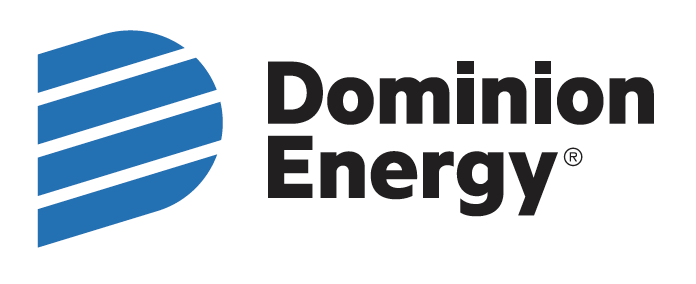Free School Programs
Please note: Dominion Energy School Programs will be offered as either an on-site field trip or a virtual program for the 2025–2026 school year. Winning schools will be able to choose the option they want.
The Aquarium proudly offers free programming to classes through donation-funded Dominion Energy School Programs. Students visiting the Aquarium as part of Dominion Energy School Programs participate in classroom activities that reinforce South Carolina state science standards.
The program is offered daily mid-October through mid-May. Teachers of all subjects are invited to apply. At the close of the application process, forms are chosen at random through a lottery system. Our programs are free, but we do require all participating K–12th grade teachers to attend a training workshop (the first year they are selected) prior to bringing their class to the Aquarium.
Our Programs
Students participating in Dominion Energy School Programs will take part in grade-specific, standards-based school programs. We provide a complimentary pre-visit and post-visit standards-based curriculum online. At-home learning and virtual modifications have been added to these activities.

Grades K–2 Habitats
Students will discover South Carolina habitats and what living creatures need to survive as they play a habitat matching game and meet some of the Aquarium’s live animals.
2021 Science Standards
K-LS1-1, K-ESS2-2, K-ESS3-1, K-ESS3-3
1-LS1-1
2-LS4-1, 2-ESS2-2, 2-ESS2-3, 2-ESS3-1
Grades 3–4 Communities and Ecosystems (Life Cycles and Adaptations)
Students will participate in an interactive game as well as meet some of the Aquarium’s animals as they discuss life cycles and the adaptations organisms need for survival.
2021 Science Standards
3-LS1-1, 3-LS2-1, 3LS3-2, 3-LS4-3, 3-LS4-4
4-LS1-1, 4-LS1-2, 4-ESS3-2
5-ESS3-1
Grade 5 Communities and Ecosystems (Food Chains and Adaptations)
Students will participate in an interactive game as well as meet some of the Aquarium’s animals as they discuss food chains and adaptations organisms need for survival.
2021 Science Standards
3-LS2-1, 3-LS4-3, 3LS4-4
4-LS1-1, 4-LS1-2, 4-ESS3-2
5-PS3-1, 5-LS1-1, 5-LS2-1, 5-PSS3-1
Grades 6–8 Watersheds
Environmental Scene Investigation (E.S.I.)! Students solve an environmental investigation. They will run tests, examine case studies and diagnose data to discover what is to blame for the watershed problems.
2021 Science Standards
6-ESS2-4
7-LS2-1, 7-LS2-2, 7-LS2-3, 7-LS2-4, 7-LS2-5, 7-ESS3-3
Grades 6–8 Earth History
Students will participate in a hands-on investigation of a fossil graveyard. They will discover what organisms were found at the site as well as when and why they died by doing fossil ID, rock layer studies and site testing.
2021 Science Standards
6-ESS1-4, 6-ESS2-1, 6-ESS2-2, 6-ESS2-3
7-LS2-1, 7-LS2-2, 7-LS2-4, 7-LS2-5, 7-ESS3-1, 7-ESS3-3
8-LS4-1, 8-LS4-2, 8-LS4-6
B-LS2-2, B-LS2-4, B-LS2-6, B-LS2-7, B-LS4-1, B-LS4-2, B-LS4-4
E-ESS1-6, E-ESS2-7
High School Human Impacts (Sea Turtles)
Sea Turtle ER! Students will “diagnose” two models of injured sea turtles by examining x-rays, sifting through fecal samples, running blood tests and doing external observations. They will discover why sea turtles strand and what they can do to help.
2021 Science Standards
B-LS2-1, B-LS2-2, B-LS2-6, B-LS2-7, B-LS4-5, B-LS4-6
E-ESS2-7, E-ESS3-3, E-ESS3-4, E-ESS3-6
High School Human Impacts (Dolphins)
Students will examine two models of stranded dolphins by doing external observations, measuring toxin levels in stomach contents and blubber, counting white blood cells and testing for respiratory infection. They will discover why dolphins strand and what they can do to help.
2021 Science Standards
B-LS2-1, B-LS2-2, B-LS2-4, B-LS2-6, B-LS2-7, B-LS4-5, B-LS4-6
E-ESS2-7, E-ESS3-3, E-ESS3-4, E-ESS3-
Teacher Workshops
All science teachers are required to attend a School Program Teacher Workshop the first year they win a free program. More information on the dates and times of the workshops will be given via email to the teachers who win a free program.

Special thanks to Dominion Energy for championing the future of this flagship education program at the South Carolina Aquarium.

